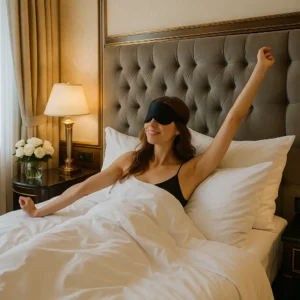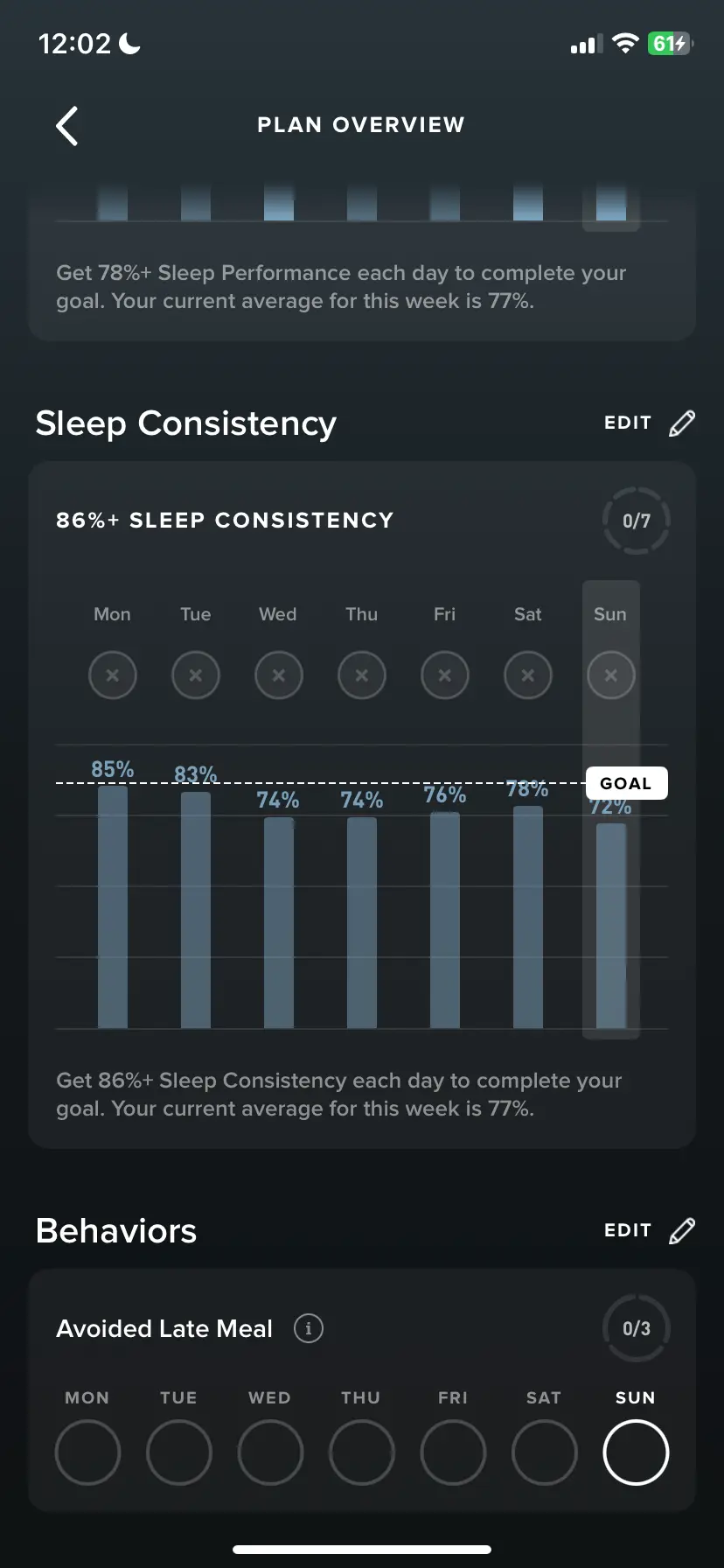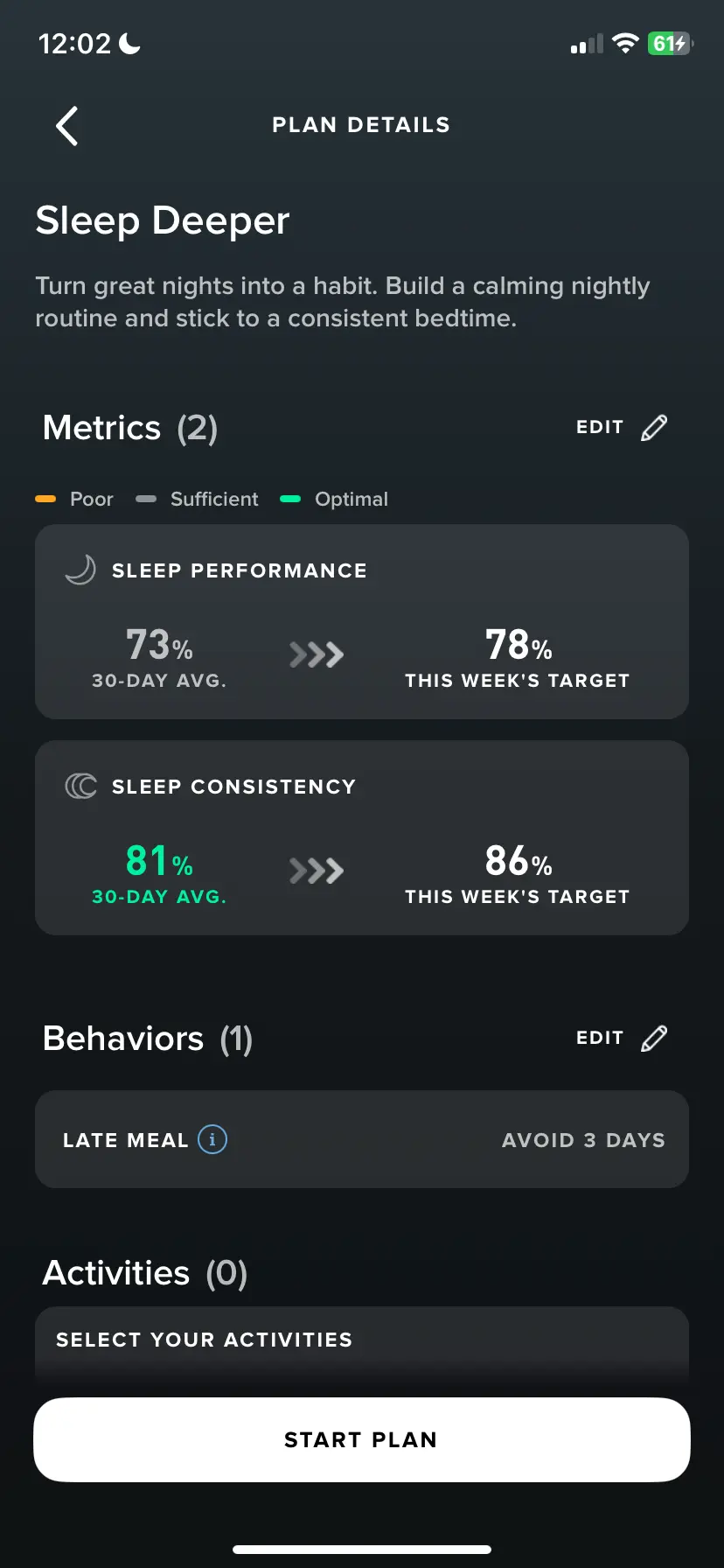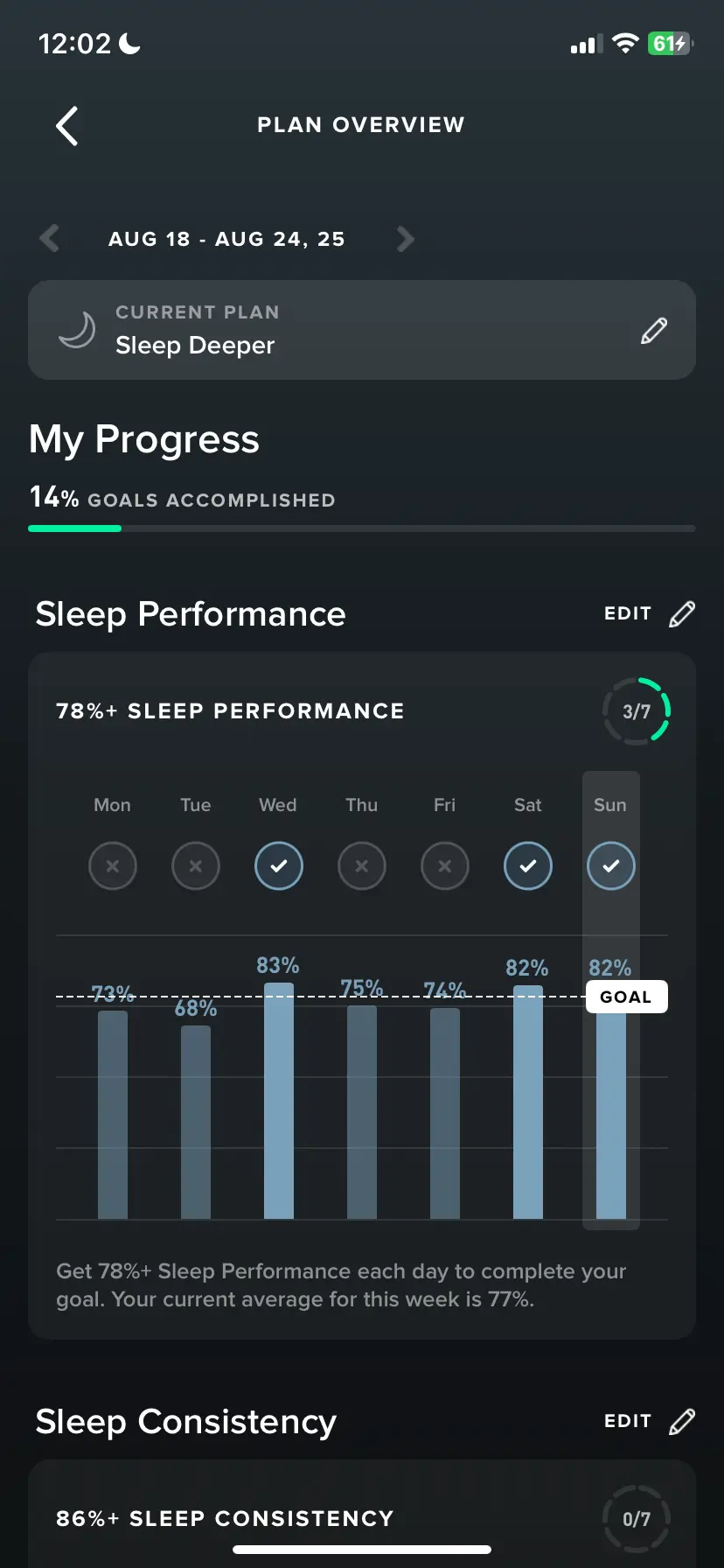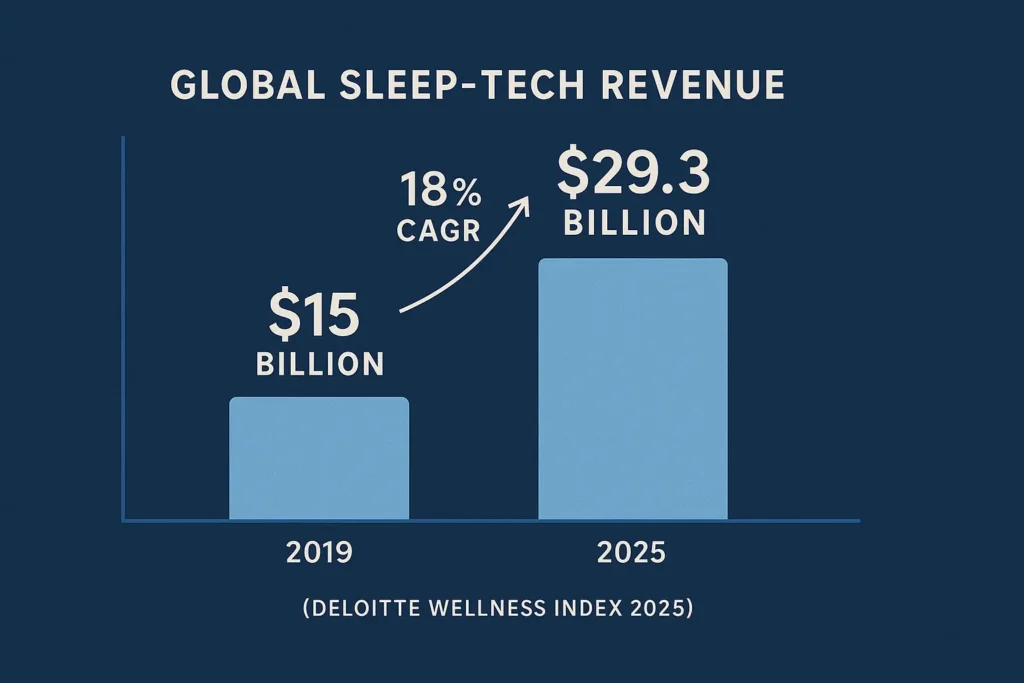“We’ve spent decades hacking our days for productivity—2025 is the year we finally hack our nights.”
A global surge of insomnia, anxiety, and always‑on lifestyles has forced sleep from after‑thought to front‑page headline. From AI‑powered coaching rings to billion‑dollar “sleep suites” in five‑star hotels, the rest revolution is here—and it’s moving fast. This deep‑dive unpacks the science, tech, and cultural currents shaping how we’ll snooze (or not) over the next decade.
Key Trends Shaping 2025
Restless Minds, Sleepless Nights – The rise of sleep anxiety in a 24/7 world
Poor sleepers are 3× likelier to rate their mental health below average, and 43 % of adults reported more anxiety in 2024 than 2023, according to the American Psychological Association.
Why Anxiety Steals REM
Stress hormones like cortisol spike at night, shortening REM cycles and fragmenting dreams—leaving you groggy at dawn.
Takeaway: Expect a surge in demand for non‑pharmaceutical anxiety‑sleep solutions—from breath‑work apps to pre‑bed “sleep mocktails.”
The AI Sleep Revolution – How smarter tech and personalized coaching are transforming rest
AI is no longer confined to lab data crunching; it’s in your mattress, your ring, and your phone—learning your rhythms and nudging better habits. Oura Ring Gen 4 now offers adaptive “Sleep Coaching” prompts based on seven‑day trend analysis, while Apple Watch 10 beta‑tests on‑device sleep‑apnea alerts (Journal of Clinical Sleep Medicine).
Sleep Sells – Why hotels & wellness brands are investing billions in “rest experiences”
The global “sleep economy” is set to hit $585 billion this year (McKinsey wellness report). Luxury chains like Six Senses offer circadian‑lighting rooms, while premium airlines test lie‑flat nap pods in business lounges.
Mini‑Case Study: Sleep With Six Senses package increased average nightly rate by 18 % yet drives a 9.5⁄10 guest‑satisfaction score.
A New Dawn for Sleep Apnea – Advances in detection and treatments
Home‑based polysomnography kits and FDA‑cleared smart rings could cut diagnostic costs by 70 % (Sleep Review Magazine). On the therapy front, daytime neuro‑stim devices show promise for positional apnea.
The Sleep Divorce Phenomenon – How sleep patterns are reshaping modern relationships
One in three couples now opt for separate beds or rooms to protect rest (National Sleep Foundation survey). Relationship therapists say honest “sleep negotiations” beat silent resentment.
Wellness Fads & Biohacks
Sleepmaxxing Explained – TikTok’s wellness craze
The hashtag #sleepmaxxing has surpassed 500 million views. Influencers promote blackout curtains, magnesium mocktails, and even mouth‑taping. But experts warn that obsessive optimisation can backfire, fuelling orthosomnia—sleeplessness triggered by fixation on perfect sleep scores (Sleep Foundation).
Nutraceuticals & Supplements
- Melatonin — widely used, but timing matters; dose >3 mg may delay circadian phase (NIH Office of Dietary Supplements).
- Magnesium glycinate
- Apigenin & L‑theanine synergy (small RCT 2024).
Behavioral Hacks
Mouth‑taping for nasal breathing, NSDR (non‑sleep deep rest) protocols, “grounding” bed sheets. Evidence remains sparse—placebo effect plays a starring role.
Sleep Mocktails & Functional Drinks
From tart‑cherry juice (natural melatonin) to lettuce‑water TikTok trends—flavourful, but not a substitute for sleep hygiene fundamentals.
Orthosomnia – When tracking obsession undermines rest
Healthy Tracker Habits
- Check scores after breakfast, not at 3 a.m.
- View weekly averages, not nightly noise.
- Use trends to adjust habits, not judge yourself.
Novel Rituals – Saunas, cold plunges, even Pokémon Sleep
Gamified sleep apps reward longer snoozes with collectible digital critters. Early data show a modest 12‑minute nightly increase—but long‑term adherence drops after eight weeks.
Consumer Behaviour & Industry Growth
Sleep Market Growth Indicators
Global sleep‑tech revenue rose from $15 billion (2019) to $29.3 billion (2025) at an 18 % CAGR (Deloitte Wellness Index 2025).
From Sleep Aids to Sleep Health
Companies now bundle gadgets, supplements, and coaching into subscription ecosystems—shifting from one‑off sales to lifetime‑value models.
Consumer Motivators & Habits
Top purchase drivers: more daytime energy (68 %), mental‑health support (54 %), longevity optimisation (42 %)—source: 2025 Ipsos global poll.
Technology & Devices
Wearable Trackers & Smart Rings
Apple Watch 10 introduces SpO₂‑based apnea risk flag; Oura Ring Gen 4 offers meal‑logging to model glucose‑sleep interactions. Whoop allows to you log how certain different factors may have affected your sleep (eg alcohol, caffeine, scrolling late at night etc)
Mattress‑Integrated Sensors & Smart Beds
Eight Sleep Pod 4 dynamically cools/warms each side and syncs with Nest thermostat to pre‑condition the bedroom.
Dawn Simulators, Wake‑Up Lights & Home Automation
Philips SmartSleep Sunrise 3 pairs sunrise lighting with gentle temperature ramp via Alexa routines.
Neurostimulation for Sleep – tDCS, tACS and other emerging modalities
A 2025 meta‑review of 27 RCTs showed trans‑cranial alternating current stimulation improved sleep efficiency by 11 % in chronic‑insomnia patients (Nature Sleep).
Research Frontiers in Sleep Science
Glymphatic System Insights – Brain “cleaning” during deep sleep
Real‑time cerebrospinal fluid imaging revealed pulsations that clear tau proteins, supporting the “brain‑wash” hypothesis (Science).
Personalized Chronobiology – Tailoring light therapy and melatonin timing
Machine‑learning algorithms adjust light‑pulse timing, shifting Delayed Sleep‑Wake Phase Disorder midpoints by 1.3 hours—double the effect of fixed‑time melatonin protocols.
Inflammation, Gut‑Brain Axis & Sleep – The latest findings
Short‑chain fatty‑acid supplementation increased deep‑sleep percentage in mice; first human pilots began in 2025 (NIH grant database).
Ethical & Practical Considerations
Data Privacy & Sleep Tracking
Oura’s new menstrual‑cycle algorithms raise GDPR questions about “high‑risk profiling.” Experts urge stricter opt‑in consent (European Data Protection Board).
Over‑Reliance on Technology – When more gadgets don’t equal better rest
A Mayo Clinic review found adherence to sleep tech plummets after 90 days unless paired with coaching and behavioural nudges.
Balancing Innovation with Evidence – Separating hype from science
Hype Meter Box:
Pink‑noise headbands: ★★☆☆☆ evidence
Smart rings: ★★★★☆
AI sleep coaches: ★★★☆☆ (promising but early)
Frequently Asked Questions
Are sleep gadgets worth the investment?
Often yes for awareness, but don’t expect them to “fix” sleep in isolation. Combine with habits. Personally – I have found my Whoop to be invaluable in helping me get a baseline as to how good (or bad) actually is…but it should be taken with a grain of salt.
I know for a fact on occasion its produced incorrect data – despite that, its the best way of getting some kind of idea how good or bad your sleep might be.
Can AI really coach better sleep habits?
Early studies suggest personalised nudges improve consistency, yet human accountability still beats bots for long‑term change.
What’s the risk of biohacking your sleep?
Most hacks are low‑risk, but stacking supplements can disrupt natural rhythms—consult a professional.
Further Reading & Resources
- AI Sleep Coach Explainer
- Supplement Deep Dives
- Device Reviews
- Nature Sleep special issue on neuro‑tech (April 2025)
- Science Translational Medicine glymphatic feature (June 2025)
